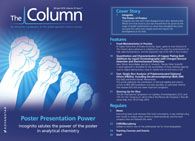Incognito: The Power of Posters
Incognito was met with initial disappointment after attending the Pittcon technical sessions, but was rescued from his gloom by the range of poster presentations on show that stimulated discussion and gave him some new insights (and new hope!) into developments in the field.
Incognito was met with initial disappointment after attending the Pittcon technical sessions, but was rescued from his gloom by the range of poster presentations on show that stimulated discussion and gave him some new insights (and new hope!) into developments in the field.
It was really, really cold in Chicago when I arrived for Pittcon (2–6 March 2014). I had travelled a long way and was looking forward to a really scintillating conference to brighten my spirits. However, by the time I reached oral presentation number five of the technical sessions on the Monday afternoon, I realized that I had heard four of the talks in the preceding three years. Things were not looking good!

Photo Credit: Aaltazar/Getty Images
My first point is that it's pretty easy to create a really appealing title and then recycle some old content to hide behind it, but it doesn't do any of us any good. For example: "A unique particle morphology to enable unsurpassed peak capacity in HPLC" could alternatively be titled "Yet another core shell particle with a slightly different shell to overall particle diameter ratio". I would have gone to this talk with high expectations, only to be disappointed. Note that this is a fictitious title to illustrate my point. Yes, with a cleverly worded title you will probably draw a larger audience than you might otherwise, but will they feel any better about you, or your company, or the subject of your talk? Please match the content to the title, and at least try to talk about something new...
So, gripe out of the way and onto my main point.
I had forgotten what a joy and how wonderful poster sessions can be — I was very much reminded at the Pittcon meeting this year.
Traditionally, at most meetings, poster sessions are for early stage research or less developed theories or instrumentation, and the audience are therefore more accepting of the "rough around the edges" content that often appears. I believe this is a widely accepted view, and therefore Technical Committees are often willing to take more of a risk on what they accept for inclusion and I think we all welcome this.
I had prepared fully for the poster sessions and marked all those that I had to see during the meeting. Of the 20 something posters that I had marked, roughly 60% of them included content, ideas, or products that told me something new: A much larger ratio than the oral sessions or symposia.
I'm not sure if it's the fact that I'm not afraid to look dumb, but I do tend to ask the poster presenters a lot of questions, so that I can fully understand what they are saying, or to challenge statements or conclusions with which I disagree. This can sometimes result in a dialogue that draws the attention of others, who may also like to understand more "but were afraid to ask". At Pittcon I was involved in six "roadblocks". You know the situation, so many people crowding around the discussion that they block the poster aisle and others have to navigate around — not all started by me I hasten to add! This was absolutely marvellous.
In comparison to the often sterile, hackneyed debate that was happening "in chamber" during the oral sessions, these debates were lively, multifarious, and, on occasions, argumentative. Absolutely what I needed to cheer me up during the meeting.
Of course, as always, the posters were of a highly varying standard — from professionally produced "glossy" posters of vendors, through to six pieces of A4 paper stuck with many pins to the poster board. Some ignored the golden rules of poster production, others stuck to them fairly rigidly, but the majority were fresh and hopeful and just what we need in our industry right now. They represented the real cutting-edge, or the re-purposing of a technology or the novel application, and by their very nature are an "advertisement" for the science they contain, rather than a reworked summary of what has gone before. The poster should represent emerging facts; not the checked and double-checked information that we produce for oral presentations or submissions to journals.
I actually made notes after my poster sessions in advance of writing this piece, and I offer these notes below in order to really stimulate the use of the poster to help breathe some life back into our scientific discussions:
1) If it's your turn to "man" the poster, turn up! There is nothing so bad as an unmanned poster that captures interest, but there isn't anyone there to discuss it with!
2) If someone asks you a question about your poster, be very honest with your response and willing to enter into a dialogue, even if you don't know the answer to a question. I've learnt a lot over the years from people viewing my own posters who know a whole lot more than I do.
3) Don't ask questions at posters to show you know more than the author, even if you do. Have the decency to enter into a dialogue which is constructive and challenging but ultimately encouraging for both parties.
4) When preparing your poster, think of it as an advertisement for your work, rather than a summary of all that has gone before. Highlight what you think is really cool about your science or your product.
5) It's a pity that there isn't an obvious mechanism for us to provide feedback or even a "score" for the posters on display. I know there are prizes and judges who decide the best poster, but I'd also like to give my own personal feedback.
6) Use a QR code next to your poster so that people can obtain an immediate re-print. An envelope for business cards always leaves me wondering if I will ever receive it. Several years ago I saw a vendor representative take cards from an unmanned poster and note down all of the contact details, as they, presumably, had a similar technology they were trying to promote. I couldn't decide on exactly which word to use to describe the person — I'll leave it up to you in this case.
So for all of you who had the dubious pleasure of a "discussion" with me this year at your poster, I thank you and you can rest assured that you all collectively made my Pittcon.
For anyone reading this, think about how a well-organized poster session might benefit your own situation. Could it be used to highlight and stimulate discussion between departments in your own workplace? Perhaps a competition even? Could it be used as a mechanism to select folks for their industrial placement year in industry, or even as part of your recruitment process?
Vive le débat.
This article is from The Column. The full issue can be found here:http://images2.advanstar.com/PixelMags/lctc/digitaledition/April28-2014-uk.html

Fundamentally Speaking (Part 2)
May 14th 2025Michael Lämmerhofer from the Institute of Pharmaceutical Sciences, University of Tübingen, Germany, spoke to JFK Huber Lecture Award winner of 2024 Torgny Fornstedt, professor in analytical chemistry and leader of the Fundamental Separation Science Group, Karlstad University, Sweden, about his pioneering work in high performance liquid chromatography (HPLC) with a focus on fundamentals, ion-pair chromatography, and oligonucleotide applications.
Biopharmaceutical Characterization in the Age of Artificial Intelligence
May 13th 2025AI-powered tools are enhancing precision, efficiency, and decision-making in biopharmaceutical development. Recently, Jared Auclair and Anurag Rathore explored AI's evolving role in biopharmaceuticals in detail.
Reversed-Phases for LC Deliberately Doped with Positive Charge: Tips and Tricks for Effective Use
May 13th 2025In this month's edition of LC Troubleshooting, Dwight Stoll and his fellow researchers discuss both the benefits (improved peak shape/loading) and challenges (excessive interaction) associated with charge-doped reversed-phase (RP) columns for both analytical and preparative separations.

.png&w=3840&q=75)

.png&w=3840&q=75)



.png&w=3840&q=75)



.png&w=3840&q=75)









